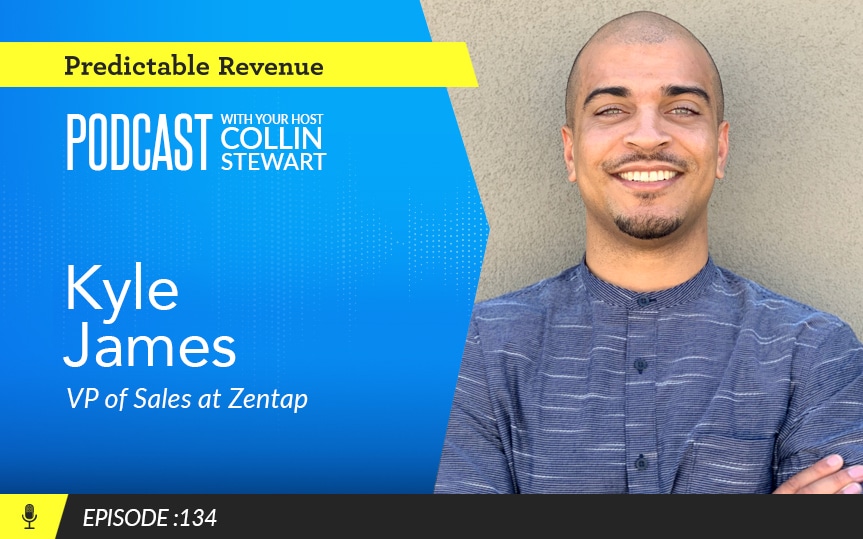How to Cultivate Presence and Show Up on Every Sales Call

Sales can, oftentimes, be a challenging head game.
Years ago, I used to hang drywall and I had buff shoulders (really buff, if I do say so myself) because that’s what I was doing day in and day out. It was a physically exhausting job that produced, well, physical effects.
Of course, working your body isn’t the only thing that is exhausting: so is 8 hours of cold calls. Week after week, quarter after quarter, and year after year – the challenges of sales have a way of wearing you down.
After a long day of prospecting, it’s easy to just veg out on the couch when you get home. Staying in the habit of “sharpening the saw” and working on improving your skills, your mindset, and your overall health can be a challenge. There is only so much time in the day, after all.
But the truth is, regardless of how many spread minutes we can carve out for ourselves, that you have to keep sustaining yourself, building your strength, and achieving as much clarity as you can.
It’ll make you a better sales rep, and a better person.
“In my younger days, I wasn’t the best person I could be. I wasn’t maximizing my potential. When I was a teenager, and in my early 20s, I wasn’t the same person I am now. I wasn’t aware of the things that I know now that makes me happy,” says Kyle James, VP of Sales at Zentap, on a recent edition of The Predictable Revenue Podcast.
“Failure, to me, is the only thing that sunk in and helped me grow. It helped me ignore the negativity, change my life, and accept that making a change was the right way to go. It brought me to a place where, finally, I had an eagerness to learn. I wasn’t interested in formal education, but now I love it. I now have a thirst to learn more, and that is the product of failure.”
The importance of staying present
At the core of that clarity, and James’ growth, is the ability to achieve a consistent state of presence in every aspect of the job – that means in every call, every demo, and every CRM update.
I know, I know, sounds impossible, right? Surely the drudgery of the job doesn’t require being present, does it?
Well, it does.
The more “inside” a call we are, the more active we are when taking notes, and the more positive we are when reiterating those notes, all helps when we’re we’re with a customer.
It is so easy to go on autopilot, and simply start reciting our notes and scripted value props. But that coasting comes at a cost: inspiration for our job will drop, and, in the moment, the person on the phone will notice your lack of interest.
“Cold calling isn’t hard in comparison to other things in life. But, if you’re not in the right frame of mind, then it can become hard,” adds James.
“There has to be a focus and emphasis on why we persist, versus the alternative.”
The RPV framework
Of course, talking about mindfulness is one thing. Being mindful is another.
To give his team – reps and the company as a whole – the tools to actually implement that critical mental infrastructure, James likes to use the “RPV Framework” popularized in Clayton Christensen’s book The Innovator’s Dilemma.
The pillars of the RPV framework are: resources, processes, and values (something every company, to some degree, has).
How these elements work together, however, is critical. For example, companies are always defining and re-defining processes, and the resources a company has enabled those processes. Together, resources and processes define values – the ultimate criterion for how decisions are made.
And the strength of those values, hopefully lived by every person in your organization, become a guiding force that directs your company where it needs to go.
“If your values are strong enough, then everyone can make a decision. You don’t have to go looking elsewhere for help. Ultimately, it’s about becoming one with the culture. You want to define what is currently in place, understand where you are at as a company, this is important. It’s tough to get that down, and you have to be okay with things not being perfect. It’s not about defining a job, or conformity,” says James.
“It’s about putting down a context so people can think at a higher level, mull over the small points, and ignore the things that aren’t important. It can’t be designed by one person, it starts with the founders, but everyone should be a part of it.”
(Editor’s note: we had Salesforce’s Steve Bullington on the pod a while back to discuss effective early career development for recent grads. You can read about our chat here, or listen to the whole in-depth interview here)
Teaching mindfulness to your colleagues
Even with an effective company framework in place, however, teaching mindfulness can be a tricky thing.
First off, this takes a light touch – you can’t force your beliefs on people. You can give them the space and the tools to find their own way, but you can’t impose in this realm.
It’s too personal.
“You have to get to know your team – what do they care about? And make sure you are not pushing your beliefs onto them. You can’t assume your way of viewing the world if the best thing for that person,” says James.
“If your beliefs spark curiosity, and they want to dive deeper, then you should be happy to help. But, don’t assume.”
That said, good sales leaders should be in tune with how their team is doing. If your reps are down, for instance, that is an opportunity to check in with them and, if applicable, share some mindfulness tips and tricks with them.
“When people are upset or feeling down, I tell them about how I deal with things. It is a light touch – I’m not super preachy about it,” says James.
“Just illustrate how you live certain values, and how it helps you. This is important for me, because I want to make sure I don’t come across as too intense.”
For more on James thoughts on mindfulness – including how he, and his team at Zentap, train their SDRs – check out the rest of his interview on The Predictable Revenue Podcast.
NO TIME TO READ?
Listen On:


